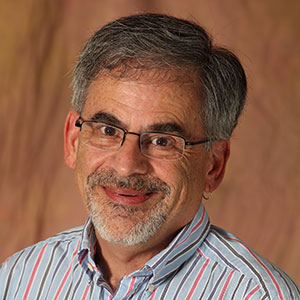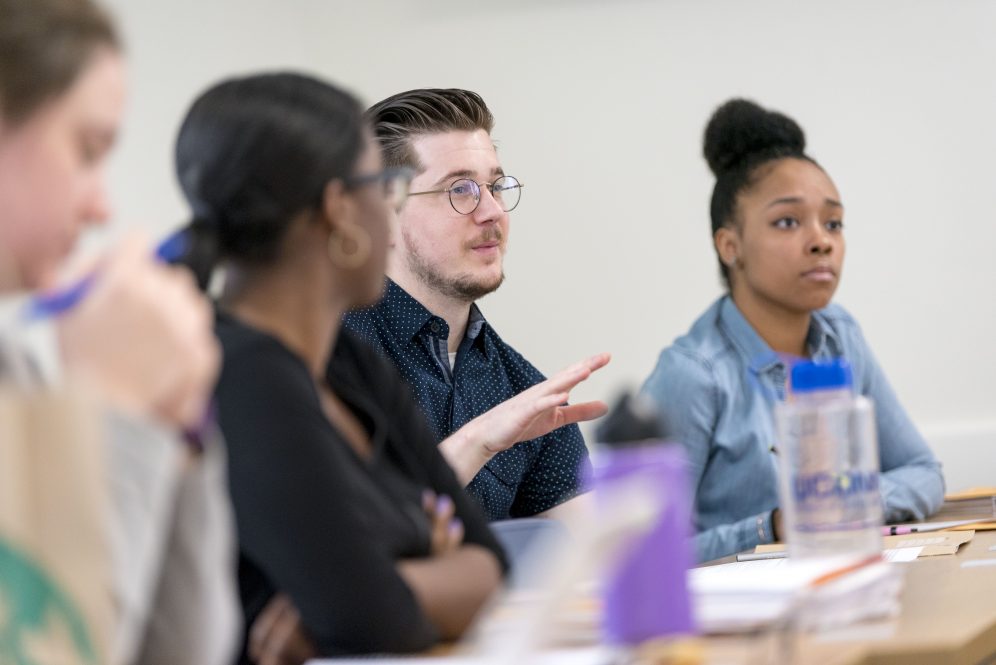After earning his bachelor’s degree in political science and working for the George McGovern presidential campaign, Peter Papallo just needed a job.
His options were to sell men’s clothing or to be a direct care worker in a residential youth services center. He thought the clothing store would be boring, so took the direct care job and “fell in love with it.”
Now, nearly 50 years, a master’s in counseling, an MSW, and several clinical social work posts later, Papallo is retiring from the School of Social Work, where he is an extension instructor. Named 2013 Educator of the Year by the Connecticut chapter of the National Association of Social Workers, Papallo — who had initially planned to be a political science professor — found his skill as a teacher almost by accident, as well.

Having served as a field instructor advising School of Social Work students in their field internship placements for several years, Papallo was invited in the early 2000s to speak to a “Clinical Conditions” class by Brenda Kurz, now an associate professor and MSW program director.
“I was really nervous. I got the biggest cup of coffee I could get; I went in and said, ‘I’m embracing my anxiety,’” Papallo recalls. “She invited me back the next year, and then there was an opening to teach a skills lab as an adjunct when the Advanced Standing program was new. I loved it. I loved being in front of the classroom and sharing my knowledge and learning from the students.”
The students loved him, too, and he landed a permanent role in 2006. Described by Dean Nina Rovinelli Heller as a highly sought after professor, Papallo says he brings his decades of experience facilitating group therapy to the classroom.
“I encourage everyone’s involvement; I encourage students to learn from each other and not just from me, to share their experience, and I share tons of my practice experience when appropriate,” he says. “I also try to be kind and understanding. I remember what it was like to be a student and have all those responsibilities. I try to formulate mutual aid — students really seem to respond to it.”
During his decades in clinical practice, he worked with adults at different mental health treatment centers and always prioritized group therapy.
“I love group work. My first training, even before I earned my master’s, was in group work,” he says. “That’s the core of how I understand social work and what social work can do. It’s allowing people to help each other.”
Among his proudest accomplishments as an instructor are developing new courses, Papallo says, and he was instrumental in redeveloping the School’s LGBTQ elective, "The LGBT Experience: Sexual and Gender Diversities.” An active volunteer in the LGBTQ-plus community, Papallo has been a trusted mentor to many LGBTQ-plus students during his time at UConn.
“I’ve been out [as a gay man] in my career for a long time; I consider it a natural part of my role to be out to students and let them know my door was always open,” he says. “I have great confidence that the School will continue to support the LGBTQ community.”
Social justice is a crucial piece of the social work profession, and Papallo foresees it becoming even more vital in the coming years.
“It’s always been important, but now more than ever, social workers need to stand up and support the people who are marginalized and overlooked. My role is to facilitate mutual aid so people can learn to help themselves and not need the help of a social worker at some point,” he says.
“I think the field is going to go through some big, important changes with the social justice movements, Black Lives Matter, and movements for racial justice,” he says. “Even though I’m a micro-focused fellow, I understand the impact of the macro world and try to integrate that into my classroom teaching. I hope there’s more of a blend between micro and macro as the field continues on.”
But after retiring in August and teaching a course as an adjunct in the fall, the field will continue on without Papallo — who, frankly, deserves a break.
“I’ve been working since I was 15; I’ll be 71 in August,” he says, laughing. “I have a pile of non-social-work-related books in the den I want to get to, and we just redid our back porch, so I can sit on the rocking chair in nice weather.”



